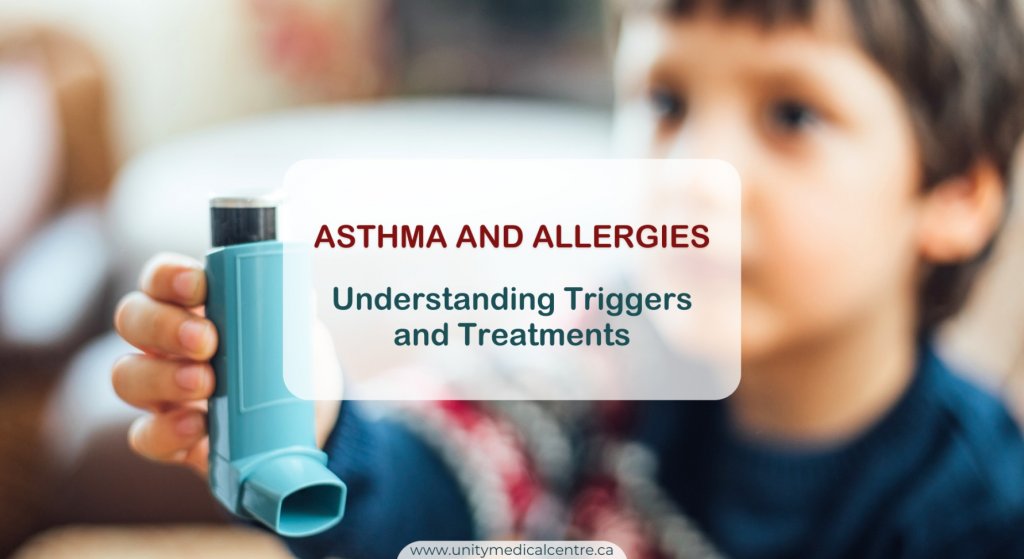
Asthma and Allergies:
Understanding Triggers and Treatments
Asthma and allergies are pervasive health conditions that significantly impact the quality of life for millions of people worldwide. Although distinct in their manifestations, these conditions often intersect, as many asthma sufferers also experience allergies. This article explores the triggers and treatments of asthma and allergies, aiming to provide a comprehensive understanding that can help manage these conditions effectively.
Understanding Asthma
Asthma is a chronic respiratory condition characterized by inflammation and narrowing of the airways, leading to difficulty in breathing. Common symptoms include wheezing, coughing, chest tightness, and shortness of breath. The severity of asthma can vary from mild to severe, and in extreme cases, it can be life-threatening.
Triggers of Asthma
Asthma triggers are diverse and can differ from person to person. Common triggers include:
- Allergens: Pollen, dust mites, mold spores, pet dander, and cockroach droppings are typical allergens that can induce asthma symptoms.
- Irritants: Tobacco smoke, air pollution, chemical fumes, and strong odors can irritate the airways and provoke asthma attacks.
- Physical Activity: Exercise-induced asthma is a condition where physical exertion leads to asthma symptoms.
- Weather Conditions: Cold air, sudden weather changes, and high humidity can exacerbate asthma symptoms.
- Respiratory Infections: Viral infections such as the common cold or flu can trigger or worsen asthma symptoms.
- Emotional Stress: Intense emotions and stress can influence breathing patterns and trigger asthma symptoms.
Understanding Allergies
Allergies occur when the immune system overreacts to substances that are typically harmless, known as allergens. This overreaction can cause symptoms ranging from mild (sneezing, itching, and rashes) to severe (anaphylaxis, which can be life-threatening).
Common Allergens
Asthma triggers are diverse and can differ from person to person. Common triggers include:
- Pollen: Produced by trees, grasses, and weeds, pollen is a major trigger of seasonal allergies.
- Dust Mites: These microscopic organisms thrive in household dust and can trigger allergic reactions.
- Mold: Mold spores, present in damp environments, can cause allergic reactions.
- Animal Dander: Proteins found in the skin flakes, saliva, and urine of furry pets can trigger allergies.
- Food: Common food allergens include nuts, shellfish, eggs, and dairy products.
- Insect Stings: Venom from stings of bees, wasps, and other insects can cause severe allergic reactions.
Treatments for Asthma and Allergies
Effective management of asthma and allergies involves identifying triggers, avoiding exposure to them, and using appropriate medications.
Asthma Treatments
- Long-Term Control Medications: These include inhaled corticosteroids, leukotriene modifiers, and long-acting beta-agonists (LABAs). They help reduce inflammation and prevent asthma symptoms.
- Quick-Relief Medications: Also known as rescue inhalers, short-acting beta-agonists (SABAs) provide immediate relief from acute asthma symptoms.
- Biologic Therapies: For severe asthma, biologics such as omalizumab target specific pathways in the immune system to reduce inflammation.
- Bronchial Thermoplasty: This procedure uses heat to reduce the thickness of the airway walls, thereby decreasing asthma symptoms.
Allergy Treatments
- Antihistamines: These medications block histamine, a chemical released during an allergic reaction, thereby reducing symptoms such as itching, sneezing, and runny nose.
- Decongestants: Used for short-term relief, decongestants reduce nasal congestion.
- Nasal Corticosteroids: These sprays reduce inflammation in the nasal passages and are effective for managing nasal allergy symptoms.
- Immunotherapy: Allergy shots or sublingual tablets expose the body to gradually increasing amounts of an allergen, helping to build tolerance and reduce the severity of allergic reactions over time.
- Epinephrine: For severe allergic reactions (anaphylaxis), epinephrine auto-injectors provide immediate treatment and can be life-saving.
Lifestyle and Home Remedies
In addition to medical treatments, several lifestyle adjustments and home remedies can help manage asthma and allergies:
Maintain Clean Indoor Air: Use air purifiers, keep windows closed during high pollen seasons, and regularly clean to reduce dust and mold.
- Monitor Pollen Counts: Stay indoors when pollen counts are high, and shower after being outdoors to remove pollen from your body.
- Use Allergy-Proof Bedding: Encase mattresses and pillows in allergen-proof covers to reduce exposure to dust mites.
